Post-Concussive Syndrome
At the 2018 Insurance Rehab Synergy Group Annual Conference, Elizabeth Sandel, MD, Medical Director for Paradigm Managment Services, discussed post-concussive syndrome.
Annually there around 2.5 million people with concussions and it is estimated that 25% of the population will have a concussion at some point in their life. Incidents of concussions are up significantly, but this is likely due to greater awareness of the issue so people seek treatment.
According to a NPR-Truven poll, 29% of people who reported they have had a concussion say they have long-term headaches. However, there is no validation that the headaches are linked to the alleged concussion. This is based on self-reporting.
A Blue Cross/Blue Shield study showed females who were diagnosed with a concussion were 60% more likely to develop post-concussive syndrome and have long-term symptoms. There is little understanding of why this occurs.
The study of concussions is very challenging. The grading system that used to be used for concussions was completely arbitrary and has since been abandoned. How a person responds to a concussion is very individual. Studies of CTE, linked to repeated concussions playing football, can only be done by an autopsy study of the brain.
Another challenge in diagnosing concussions is one of the symptoms is cognitive impairment. Without a baseline study this is very difficult to document. Concussion protocols for athletes now often include baseline testing so they have something to compare to in the event of injury. Brain imaging is also not a good diagnosis on it’s own. There can be a delay in pathology developing, and things present initially after the injury may go away.
Diagnosing a concussion involves looking at a wide variety of cognitive, physical, and psychological symptoms. The problem is, these same symptoms present for other conditions as well. Thus, someone who has never had a head injury could present with the same symptoms of someone that has.
According to ICD-10 standards, at least three of the following features should be present for a diagnosis of Post-Concussion Syndrome:
- Headache.
- Dizziness.
- Fatigue.
- Irritability.
- Difficulty in concentrating.
- Impairment of memory.
- Insomnia.
- Reduced tolerance to stress.
According to studies, on average, about 10% of people will not recover in a 30-90 day time frame after a concussion. Early education about the recovery and targeted treatment can decrease symptoms and increase recovery time.
Another challenge with diagnosing post-concussion syndrome is that many of the symptoms are subjective in nature, which can make them easy to manipulate if someone wants to intentionally malinger.


